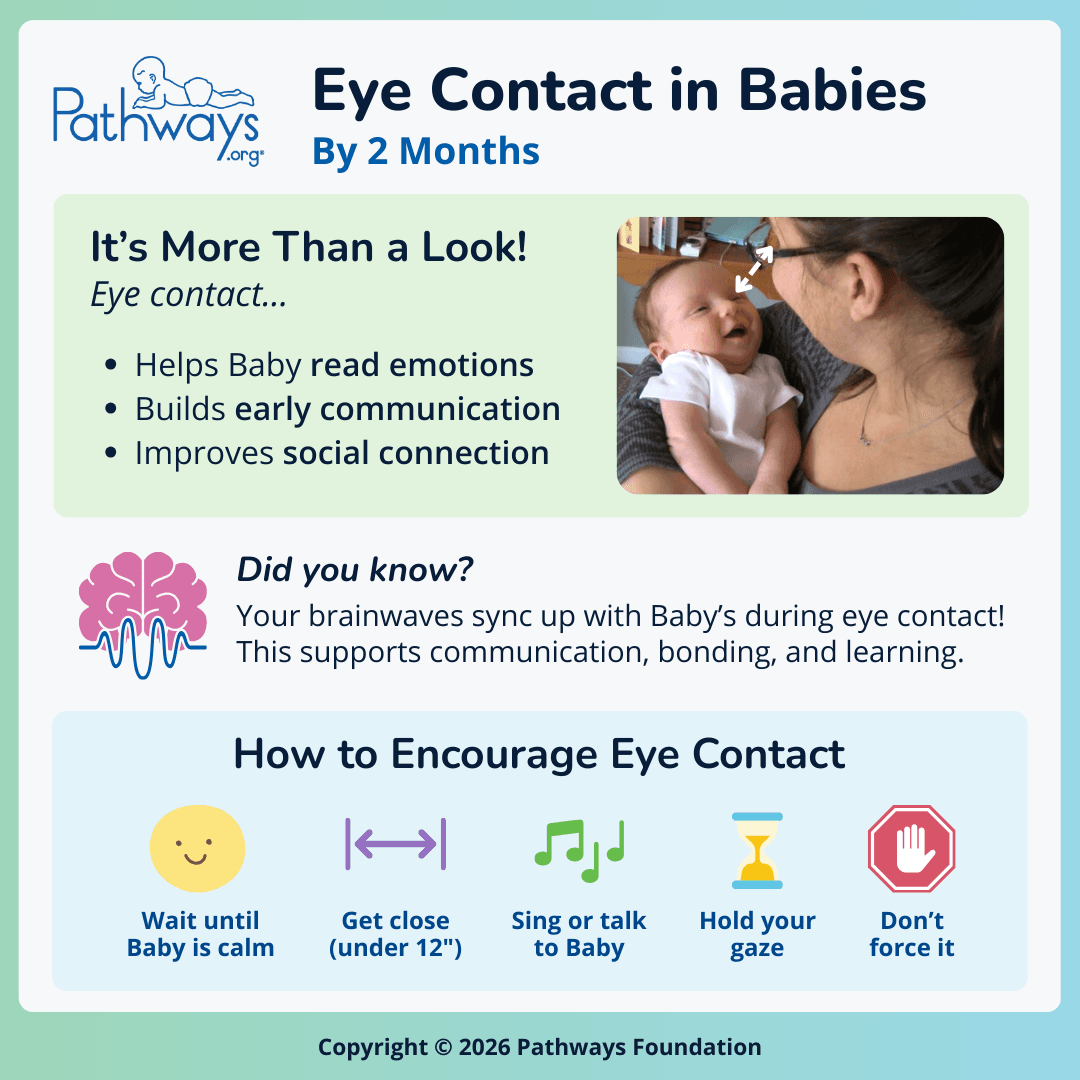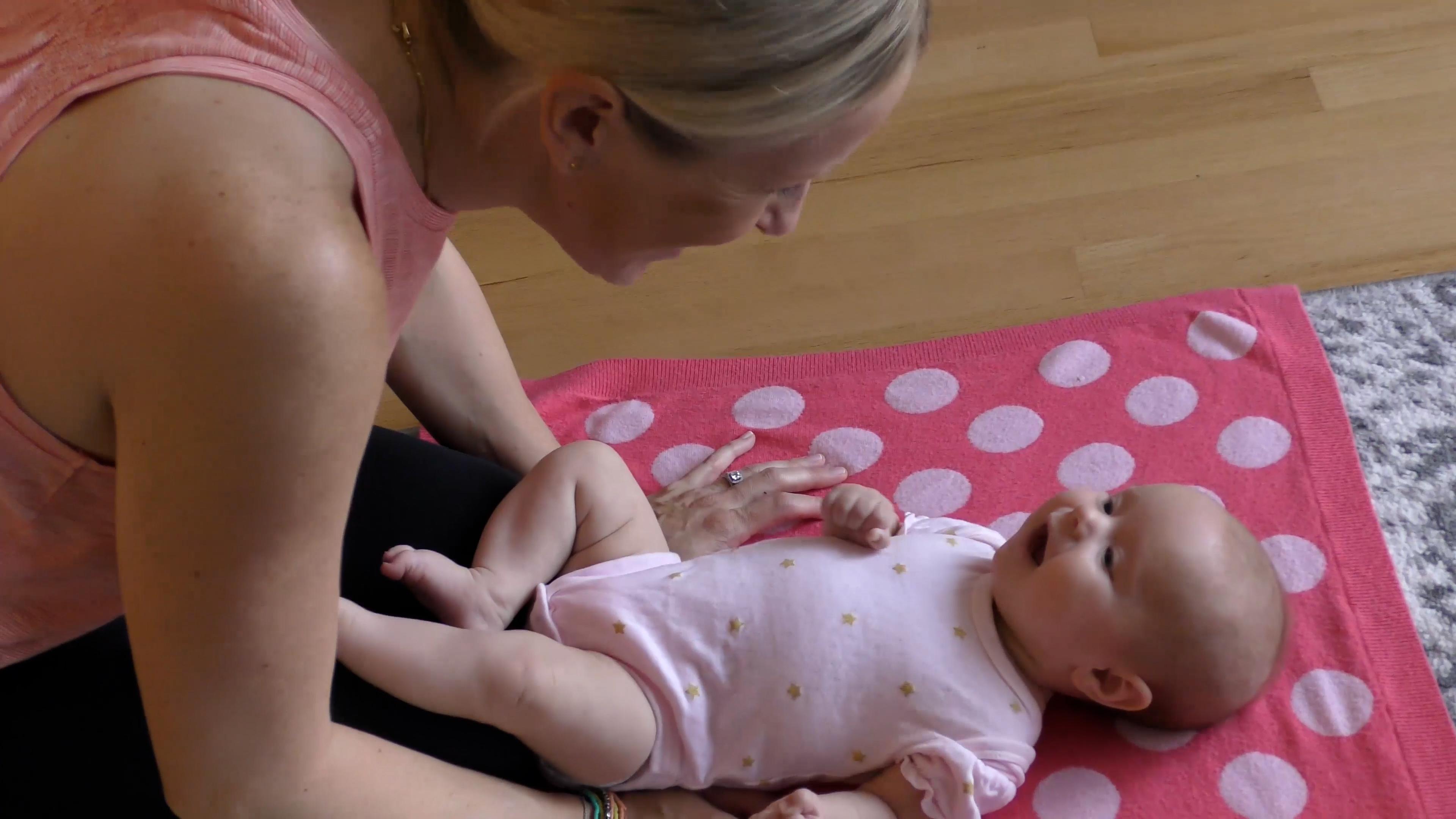Importance of Eye Contact for Baby’s Development
-xbpxbN.jpg&w=3840&q=75)
Baby should make eye contact by 2 months, but some eye crossing and wandering are still typical at this age.
Eye contact is an important skill for many areas of Baby’s development, and practicing it with Baby can support better learning and communication.
Some tips to encourage eye contact with Baby include waiting until they are calm, getting up close, and using your voice to hold their attention.
There is more than meets the eye when it comes to eye contact in babies! When they look into your eyes, it’s not just because they are curious or in awe of your beautiful face; there is so much more going on in that little brain! Find out when you can expect eye contact, and what it means for Baby’s development!
When will Baby make eye contact?
Baby should be able to make eye contact by 2 months. At this age, some eye crossing and wandering are still typical, as Baby is still developing the strength to coordinate their eyes. Their eyesight is also quite poor in the newborn months. (After all, they spend all their time before birth in a cozy, dark womb!) They can only focus on faces about 8 to 12 inches away. So when checking this milestone, be sure to hold Baby close. They also need to be calm, alert, and not hungry or tired to hold eye contact.
Why is eye contact important for Baby?
Eye contact is an important skill for Baby’s sensory, communication, and social-emotional development! It helps Baby process and respond to the emotions of others, and understand communication is a two-way street. When you practice eye contact with Baby, they are learning how important this tool is for starting interactions and sharing information with others.
And that’s not all: during eye contact with Baby, your brainwaves actually “sync up” with theirs! This amazing phenomenon, discovered in separate studies from the University of Cambridge and Princeton University, can support better communication, bonding, and learning!

Tips for Helping Your Newborn Make Eye Contact
So, how can you start practicing eye contact with Baby? Try these tips in the newborn months!
Wait until they are in a “quiet alert” state. This is the best time to engage with Baby, because they are calm and interested in their environment.
Get close to their face. Remember, Baby can only focus on things less than 12 inches away, so hold them close in your arms or get down to their level during floor play.
Sing or talk to Baby. They love the sound of your voice, so use it to hold their attention!
Hold your gaze until Baby looks away. If Baby still wants to make eye contact, keep encouraging it! Don’t drop your gaze before Baby does.
Don’t force it. If Baby keeps looking away, seems disinterested, or gets cranky, take a break. They may be tired or overstimulated.
As Baby gets better at making eye contact, they’ll also get better at tracking objects! You can help them practice by slowly moving your face from side to side while holding their gaze.

What if Baby isn’t making eye contact?
In the beginning, it’s typical for Baby to only hold eye contact for brief moments. Their eyes may wander or move randomly, but this should improve with time. It’s also important to remember that Baby is less likely to make eye contact when they are tired, hungry, or overstimulated. However, if you have concerns about Baby consistently avoiding eye contact beyond 2 months or about their eyesight in general, talk to their healthcare provider.
Vision is an important part of Baby’s sensory and communication development, so make sure to keep track of these milestones during their first year!
Sources
Fuller-Wright, Liz. “Baby and Adult Brains “Sync Up” during Play, Finds Princeton Baby Lab.” Princeton University, 9 Jan. 2020, www.princeton.edu/news/2020/01/09/baby-and-adult-brains-sync-during-play-finds-princeton-baby-lab. Accessed 9 Jan. 2026.
Leong, Victoria, et al. “Speaker Gaze Increases Information Coupling between Infant and Adult Brains.” Proceedings of the National Academy of Sciences, vol. 114, no. 50, 28 Nov. 2017, pp. 13290–13295, https://doi.org/10.1073/pnas.1702493114.
Piazza, Elise A., et al. “Infant and Adult Brains Are Coupled to the Dynamics of Natural Communication.” Psychological Science, vol. 31, no. 1, 17 Dec. 2019, pp. 6–17. PMC PubMed Central, https://doi.org/10.1177/0956797619878698. Accessed 9 Jan. 2026.
Striano, Tricia, et al. “Eye Contact Influences Neural Processing of Emotional Expressions in 4-Month-Old Infants.” Social Cognitive and Affective Neuroscience, vol. 1, no. 2, 26 July 2006, pp. 87–94. PMC PubMed Central, https://doi.org/10.1093/scan/nsl008.
University of Cambridge. “Eye Contact with Your Baby Helps Synchronise Your Brainwaves.” University of Cambridge, 29 Nov. 2017, www.cam.ac.uk/research/news/eye-contact-with-your-baby-helps-synchronise-your-brainwaves. Accessed 9 Jan. 2026.





